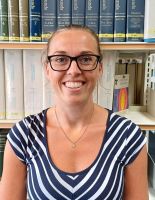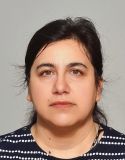Committee Members
JCG &
CSCG Chair
(SCI)
Dr Richard Greenwood FRSC C.Chem
Richard is currently the Deputy Director of Engineering Doctorate in Formulation Engineering at the School of Chemical Engineering at the University of Birmingham. As of 1 st July 2015 he will be seconded to the Centre for Process Innovation to help establish the National Formulation Centre. He graduated from Bristol University in 1991 with a BSc in Chemistry and obtained a PhD from Chemical Engineering Department at Imperial College in 1995. He has previously chaired the IChemE Particle Technology Special Interest Group and sat on the RSC Formulation Science and Technology Subject Group, where he organised numerous national and international conferences.

CISG Chair (RSC)
Dr Shirin Alexander
- Polymeric and surfactant micelles
- Green low surface energy materials
- Material chemistry and nanoparticles
- Small angle neutron scattering
- Drug delivery
Shirin Alexander received her PhD in physical chemistry from the University of Bristol, UK in 2012. Her principal research interest is in colloids, surface chemistry, materials, and polymers. Shirin took a postdoctoral research position after her PhD in the Surfactant Research group at the University of Bristol, developing a range of Low Surface Energy Surfactants. Her current research (as a Associate Professor) in Swansea University is mainly focused on material chemistry, where she combines the Low Surface Energy Materials (LSEMs) with metal oxide nanoparticles to obtain novel green (fluorine-free) superhydrophobic surfaces. The applications of LSEMs vary from protective and anti-fouling coatings to environmental, biomedical and industrial applications.

JCG & CISG Secretary
(RSC)
Dr Ignacio Martin-Fabiani
- Colloid, interface and soft matter
- Advanced microscopy and scattering techniques
- Material Science in coatings, inks, adhesives, cosmetics and crop protection
Dr Nacho Martin-Fabiani is a UKRI Future Leaders Fellow and Senior Lecturer in Materials Science in the Department of Materials at Loughborough University (UK). He leads a research group working in the fields of colloid, interface, and soft matter science. Current research lines include the development of a new generation of functional coatings – including antibacterial and abrasion resistant surfaces – and experimental and computational methods to aid soft materials formulation. He has received awards and honours for his work, including a Vice-Chancellor’s Research Fellowship at Loughborough University (2016), the Polymer Lecture Exchange Award by the Institute of Physics and the American Physical Society (2019), and a UK Research and Innovation Future Leaders Fellowship (2020). He sits on the Joint Colloids Group committee from the Royal Society of Chemistry and the Society of Chemical Industry and is Associate editor of Frontiers in Soft Matter.

CISG Treasurer
(RSC)
Dr Nick Ainger
Unilever Research & Development
- Surfactant self-assembly
- Polymer and surfactant interactions
- Formulation of colloidal systems
Nick Ainger has worked with personal care products for over 18 years. He completed his PhD in physical organic chemistry at the University of Liverpool (Chemistry, 1999), writing up after taking a position at Unilever R&D at Port Sunlight. He has worked primarily in the area of hair care but has taken an active interest in external collaborations with various institutions whilst applying colloid science expertise to develop new technologies and products.

JCG Website & Newsletters Manager
(RSC)
Dr Guido Bolognesi
- Microfluidic synthesis and manipulation of nano-/micro-particles
- Experimental microfluidics and Computational Fluid Dynamics (CFD)
- Optical trapping and manipulation
Dr Guido Bolognesi is Associate Professor in Physical Chemistry in the Department of Chemistry of University College London. He earned an international joint PhD in Theoretical and Applied Mechanics from the University of Rome “La Sapienza” and the University Claude Bernard Lyon 1. From 2012 to 2016, he worked as a post-doctoral research associate in the Department of Chemistry of Imperial College London, implementing the microfluidic engineering work stream for the synthesis, characterisation and optical manipulation of functional emulsion droplets and particles. From 2016 to 2022, he was Lecturer and then Senior Lecturer in Bioengineering in the Department of Chemical Engineering of Loughborough University. His research aims to investigate transport processes and interfacial phenomena in soft matter systems (including colloids and fluid/soft interfaces), and engineer them to develop new technologies for bio-sensing, synthetic biology, therapeutics and drug-delivery.

JCG Awards Officer
(SCI)
Dr Emma Shore
Innospec
- Surface Science and Surface Properties
- Surfactant Synthesis
Emma obtained her MChem degree in Medicinal Chemistry with Pharmacology from the University of Liverpool in 2012 and remained there for her PhD with Professor Paul O’Neill. Her thesis entitled ‘Selective inhibitors of Cyclophilin D to treat Pancreatitis’ involved the synthesis and characterisation of small molecules as well as biophysical techniques such as isothermal titration calorimetry and surface plasmon resonance.
Emma undertook a short Postdoctoral research position at the University of Liverpool before moving to industry into the role of Research Chemist at Innospec. She has since progressed to the position of Platform Leader – Surface Science where her research focus is on the fundamental understanding of surfactants in both aqueous and non-aqueous media on a range of surfaces from Personal Care to Fuel Technology applications.

SCI Colloid and Surface Chemistry Group
CSCG Secretary
Dr Azarmidokht Gholamipour Shirazi
University of Manchester
- Microfuidics
- Soft Materials
- Physical Chemistry of polymers
Azar is a multidisciplinary scientist with academic experience in Chemical Engineering, Chemistry, and Bioscience, which has enabled her to lead interdisciplinary science projects. She completed her undergraduate and Masters qualifications in Chemical Engineering, followed by her Ph.D. in organic and macromolecular chemistry at the University of Lille, France. Since then, Azar has worked as a postdoctoral /research fellow in a wide range of research laboratories in France, Brazil, Norway, China, Czechia, and the UK. She has worked on projects combining microfluidics and flow chemistry, soft materials, and physical chemistry in diverse areas from the reaction kinetics-thermodynamics study and emulsification with applications in organic synthesis and enhanced oil recovery, to the investigation of on-chip cell culture and combinatorial drug screening and isolating cells based on their sizes. She also has experience in graphene synthesis, rheological methods, and 3D printing.

CSCG Treasurer
Dr Fiona Hatton
- Polymerisation-induced self-assembly of block copolymers
- Design of functional polymer colloids
- Polymers from renewable resources

Dr David Growney
- Dispersion, emulsion and foam characterisation/understanding
- Neutron, X-ray and light scattering
- Polymer and surfactant characterisation and self-assembly behaviour
- Applications of colloids in lubricants
Dr Growney completed his undergraduate MChem and postgraduate PhD studies at the University of Sheffield, supervised by Prof. Steve Armes. His BP sponsored PhD focussed on the understanding of contaminant soot dispersion in engine lubricant. Upon completion of his PhD in 2015, he took on the role of Chemist at Lubrizol Limited (a speciality chemical company), and has since progressed to the position of Research Chemist in the Strategic Research arm of the company. Dr Growney now leads research focused on future-looking performance additive chemistries. More specifically, the work primarily focuses on the understanding of colloidal dispersions in both aqueous and non-aqueous media, emulsion formation/stability and non-aqueous fluid aeration.

Dr Lia Argentou
- Sustainable innovation with emphasis on carbon footprint reduction
- Personal & Home care product development
- Mechanistic understanding of formulation performance
- Computational chemistry (liquids & solids)
- Digital twinning
- Linking the scales between formulation & manufacturing models
Lia is a Senior Polymer & Formulation Scientist within Reckitt’s Science Platforms team. She graduated with a BEng & MEng in Chemical Engineering from NTU Athens, Greece followed by an MSc on Biochemical Engineering from UCL with an Internship in Astra Zeneca. She completed her EngD in formulation engineering and deposition of functional actives at Procter & Gamble in collaboration with the University of Birmingham. She remained at Procter & Gamble for another year focusing on the chemistry of cleaning. She joined Reckitt, Hull in 2021 where for the past 4 years she has been working on delivering upstream innovation projects with specific focus on environmental sustainably and utilising digital tools as an ally for innovation.

Dr John Hone
- Rheology of concentrated dispersions
- Stability of agrochemicals formulations
- Crystallisation and polymorphism of active ingredients
John is a Syngenta Fellow and Leader of the Particle Science Group based at Jealott’s Hill since 2019. He graduated in 1995 with a BSc in Chemistry with Industrial Experience from the Bristol University. The industrial placement at Kodak Ltd in Harrow working for Dr Andrew Howe on the rheology of concentrated dispersions was followed by a Kodak-sponsored PhD in Colloid & Polymer Science in 1999 to study adsorbed polymer layers by small-angle neutron scattering under Prof. Terrence Cosgrove. Following a year in the Eastman Kodak laboratories in Rochester, New York, John returned to Kodak in the UK. In 2006, John joined Syngenta, marking the beginning of a new chapter in his career. He initially took on a role in Formulation Development, where he applied his knowledge of colloid science to agricultural formulations. Later, he transitioned to the Process Studies Group, focusing on the solid state and crystallisation behaviour of active ingredients.

RSC Colloid & Interface Science Group
ECCo Network Representative
Dr Priyanka Dey
University of Portsmouth
- Colloidal Plasmonic gold nano-assemblies
- Raman spectroscopic cancer diagnosis
Dr Priyanka Dey is currently a Senior Lecturer in Bioanalytical Chemistry at University of Portsmouth, UK. She is also the current chair of the Early Career Colloid (ECCo) group. She attained her Ph.D. in chemistry specialising in colloidal nanotechnology and optical spectroscopy, from Queensland University of Technology, Australia. Since then, her research has been directed toward designing hybrid plasmonic-polymeric nano-assemblies and developing analytical spectroscopic solutions for disease diagnosis. This has included work in enhanced Raman scattering (SERS and SESORS) in Australia and UK, nanoplasmonics and photonics in Germany and optical nanobiosensors for clinical and point-of-care devices in Spain. She has years of experience in the ever-growing domain of novel nanoplasmonics using cutting-edge enhanced optical spectroscopic solutions especially, Raman spectroscopy for clinical diagnostic needs. She loves teaching about materials and analytical chemistry. Priyanka has been actively increasing public awareness about her research in cancer diagnosis via media platforms of BBC TV interviews and multiple radio interviews.

Dr Dwaipayan Chakrabarti
- Colloidal self-assembly
- Active colloids
- Rheology of soft matter
- Self-assembly of liquid crystals
- Topological soft matter
Dr Chakrabarti is currently a Lecturer in Soft Matter in the School of Chemistry at the University of Birmingham, where he was appointed to a Birmingham Fellowship in 2013. His expertise is in theory and computation of soft matter. He obtained his PhD in 2006 at the Indian Institute of Science in Bengaluru. He then moved with a Marie Curie Incoming International Fellowship to the University of Cambridge, where he subsequently held an Ernest Oppenheimer Early Career Research Fellowship awarded by the University of Cambridge in the broadly interpreted field of Colloid Science. He also held a Research Fellowship at Clare Hall, a graduate college in Cambridge, where he is now a Life Member. The study of soft matter is central to his research theme with a focus on informing fabrication of functional materials as well as formulation of consumer products by design. His group is particularly interested in designing novel photonic, porous, responsive and viscoelastic materials.

Dr Marijana Dragosavac
- Particle Engineering
- Encapsulation
- Controlled Release
- Emulsions
- Membranes
Dr Marijana Dragosavac obtained her PhD in Chemical Engineering at Loughborough University under the supervision of Prof Richard Holdich in 2011. During her industry funded PhD with Sellafield Ltd. (UK), she developed a membrane-based system for fast-screening and evaluation of porous materials as sorbents. She is using membranes to manufacture emulsions and drops as precursors for synthesis of solid and semisolid particles. Her principal research interests are in the field of soft particle engineering and encapsulation. Her projects span from manufacturing of bespoke microcarriers and chromatography resins to stimuli responsive micro-particles for controlled drug delivery and encapsulation of nutrients and cell/bacteria. More recently she started to explore and use membrane micro mixing to manufacture crystals and nanoparticles (cubosomes, liposomes and solid lipid nanoparticles). Marijana is a Senior Lecturer in Chemical Engineering and Chief Scientific Officer at Micropore Technology Ltd. (Redcar, UK).

Dr Claudia Contini
Imperial College London
- soft matter
- colloids
- cell mimicry
- membrane biophysics
Claudia Contini is a Lecturer in Biotechnology and Engineering Biology and a BBSRC Discovery Fellow in the Department of Life Sciences at Imperial College London. Her research focuses on bottom-up synthetic biology, where she develops synthetic cells and biohybrids to mimic, understand and enhance biological functions. Claudia earned her Master’s degree in Medicinal Chemistry from the University of Padua, Italy, and a PhD in Physical Chemistry from University College London (UCL), UK. She then undertook postdoctoral research at Imperial College London, investigating bio-nano interface interactions, before securing an ISSF Fellowship to develop innovative protocells. Claudia has received numerous prestigious awards, including the L’Oréal-UNESCO UK Fellowship, a BBSRC Fellowship, and the ‘Italy Made Me’ award from the Italian Ambassador in London, recognising her innovative scientific contributions in the UK. She currently serves as Co-Director of the Association of Italian Scientists in the UK (AISUK) and is the IUPAC National Representative for the Physical and Biophysical Chemistry Division.

Dr Shurui Miao
University of Oxford
- Self-assembly
- Surface and interfacial forces
- Ionic liquids and concentrated electrolytes
Shurui Miao is currently a Research Fellow in Chemistry at the University of Oxford, hosted by St John’s College. Before moving to the UK, he completed his PhD in 2023 at the University of Sydney, Australia. His current research focuses on understanding the underlying physical chemistry of rapid carbon mineralisation and the viscoelastic properties of concentrated electrolytes. He has experience in a range of elastic and quasielastic scattering techniques for the study of hierarchical self-assembly and sub-diffusion dynamics. His current research involves the use and development of Surface Force Balance/Apparatus for the direct measurement of interfacial molecular arrangements and forces.

Dr Farzaneh Hajirasouliha
University of Hertfordshire
- Colloids and interfaces
- Soft matter
- Bio-interfaces
- Drug Delivery
Farzaneh is a passionate research fellow at the Centre for Research in Topical Drug Delivery and Toxicology at the University of Hertfordshire. She has a diverse academic background, holding a bachelor’s degree in chemical engineering-Food Industries from Amirkabir University of Technology (Tehran Polytechnic), a master’s degree in chemical engineering-Pharmaceutical Engineering from the University of Tehran and a PhD degree in Mechanical Engineering at Northumbria University. With extensive experience in technical and regulatory affairs within the pharmaceutical industry in Iran, Farzaneh brings a wealth of practical knowledge to her current role. Her research interests span interfacial sciences, emulsions, colloids, surfactants, viscoelasticity, nanoparticles, and formulation science. She has made significant contributions to the field through her publications on the interactions of nanoparticles and surfactants. Currently, Farzaneh is focused on developing innovative pharmaceutical formulations for topical drug delivery, with a particular emphasis on interfacial science and fluid-fluid interfaces. Her work aims to enhance drug delivery efficiency while minimising environmental impact.

Prof Theoni K. Georgiou
Imperial College London
Theoni Georgiou is currently a Professor in Polymer Chemistry at the Department of Materials at Imperial College London. She obtained a B.Sc. in Chemistry and a Ph.D. in Polymer Chemistry from the University of Cyprus. Following her PhD studies, she joined Professor Antonios (Tony) Mikos’ group at Rice University in USA as a postdoctoral fellow. In October 2007 she moved to UK when she was awarded a five-year RCUK Fellowship in Colloidal Nanotechnology at the University of Hull. In 2014 she joined Imperial College as a Lecturer where she is now a Professor since 2022. She has been an active member of the scientific community; was a member of the Macrogroup committee from 2017 to 2022 and the chair of the committee from 2019 and 2022. She was also a member of the Materials Chemistry Division Council of the Royal Society of Chemistry and of the European Polymer Federation (EPF) council. In 2017 she was awarded the 2016 Macro Group UK Young Researchers Medal. She is a member of the advisory editorial board of Polymer International, Polymer Chemistry and European Polymer Journal. Finally, she is an Associate Editor for European Polymer Journal since 2022.

Dr Clare Rees-Zimmerman
University of Bath
- Colloidal interactions and hydrodynamics
- Thin-film materials
- Formulation engineering
Clare is a chemical engineer by training, completing her MEng and PhD degrees at the University of Cambridge. She undertook various industrial summer internships, including in R&D at Procter & Gamble. Clare’s PhD work examined how a mixture of differently sized particles self assembles in a thin film as it dries. For this work, she won the 2023 Lighthill-Thwaites Prize from the Institute of Mathematics and its Applications (IMA), along with the 2023 Katharine Burr Blodgett PhD Award from the Joint Colloids Group. From 2022–2025, Clare was a Junior Research Fellow at Christ Church, University of Oxford, hosted by Prof. Dirk Aarts, Department of Chemistry. In 2026, she started as a Lecturer in Chemical Engineering at the University of Bath. Her current research addresses the need to make functional materials and formulations more sustainable.

Membership
You can become a member by joining one of the two groups:
SCI Colloid & Surface Chemistry Group (CSCG). http://www.soci.org/Membership-and-Networks/Technical-Groups/Colloid-and-Surface-Chemistry-Group
RSC Colloid & Interface Science Group (CISG). http://www.rsc.org/membership/networking/InterestGroups/colloidscience/
The former is open to SCI members only. The latter is open both to RSC members and associates AND to scientists and engineers who belong, either, to a chartered professional or learned body from outside the chemical sciences, or to another chemical society with whom the RSC has entered into an international partnership agreement approved by RSC Council. Non-RSC members of CISG pay RSC a small annual fee to cover administration and postage.
For information on how to become a member of the Society of Chemical Industry (SCI) or Royal Society of Chemistry (RSC) please see the links below:
http://www.soci.org/Membership-and-Networks http://www.rsc.org/Membership/join/admission/index.asp
Non-members of RSC wishing to join CISG should contact the RSC Membership Dept. (contact details at http://www.rsc.org/Membership/join/admission/Contacts.asp), asking to join the Colloid & Interface Science Interest Group, only, and mentioning their own affiliation. The membership administration fee is £10 currently. In case of difficulty please contact a member of the Joint Committee.
© Colloids & Surface Science Group. All rights reserved.
